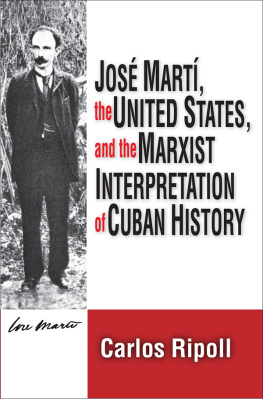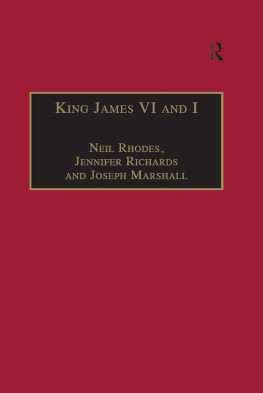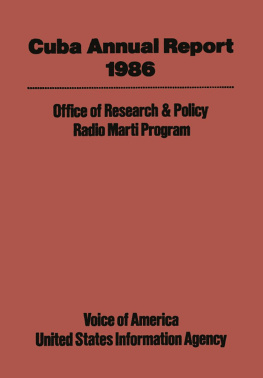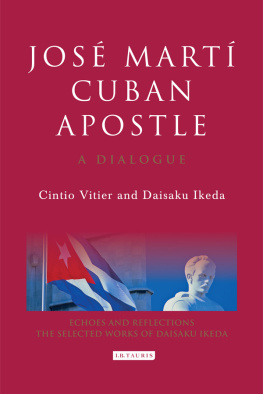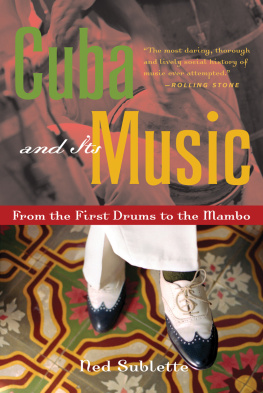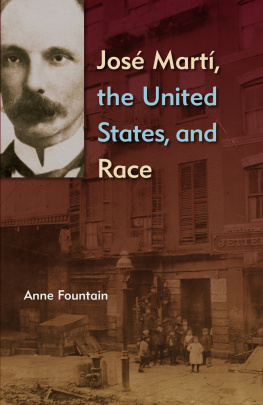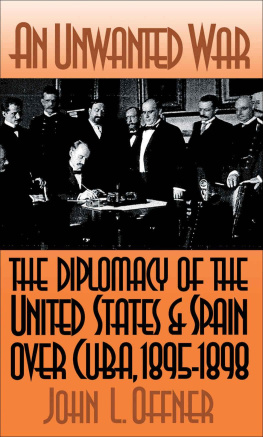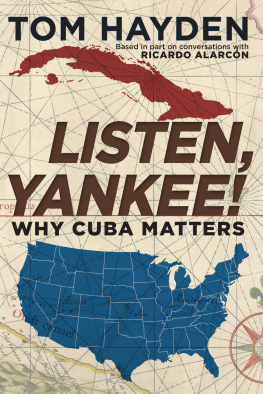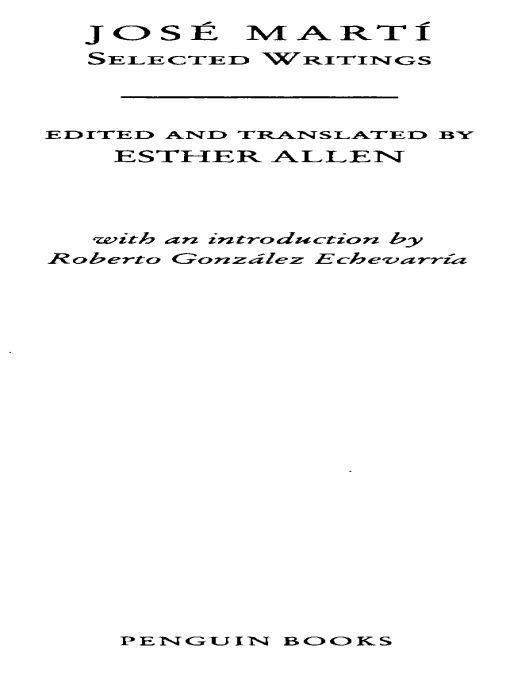Table of Contents
JOS MART: SELECTED WRITINGS
Born in 1853 to a humble family, JOS MART embarked early on a life of political struggle and literary achievement. At fifteen, he wrote an epic poem in praise of Cubas war of independence against Spain, and at seventeen he was imprisoned and sentenced to hard labor for his political activities. At eighteen, while in exile in Spain, he published a thundering, implacable denunciation of the Spanish treatment of Cuban political prisoners, which made him an important voice in the Cuban nationalist movement and had considerable impact on the thinking of Spanish liberals. For the rest of his life, he wrote and worked unstoppably for the freedom of Cuba. He founded the Cuban Revolutionary Party and was until his death the central architect of the Cuban independence movement. His political involvement was accompanied and complemented by a constant and relentless outpouring of poetry, literary prose, journalism, and political writing. In 1895 he returned to Cuba with a military force to embark upon another revolution and soon thereafter met a suicidally heroic death in battle.
ESTHER ALLEN has translated numerous works from Spanish and French, including The Book of Lamentations, by Rosario Castellanos ; portions of Selected Non-Fictions, by Jorge Luis Borges; and, most recently, Dark Back of Time, by Javier Maras.
ROBERTO GONZLEZ ECHEVARRA is Sterling Professor of Hispanic and Comparative Literatures at Yale and the author of many books of criticism. He co-edited the monumental Cambridge History of Latin American Literature.
JOS MART: AN INTRODUCTION
AGAINST THE ADVICE of General Mximo Gmez, military leader of the Cuban insurgent army, Jos Mart mounted his horse and rushed in to do battle with the Spanish troops. It was May 19, 1895, and the men had been in the Cuban countryside for a little more than a month. They had landed at La Playita, on Cubas easternmost southern coast, having sailed there from nearby Haiti, where they had gathered after crossing over from the Dominican Republic. The war against Spanish rule had been launched on February 24 with an uprising that had not been as successful as expected. At Fernandina Beach, on Floridas east coast, the American authorities had confiscated three small steamships loaded with weapons and supplies that Mart, through his tireless fund-raising efforts, had managed to purchase. Undaunted, Mart had forged ahead with plans for what he had hoped would be Cubas definitive war of independence. The skirmish into which Marti rode had flared up near the confluence of two rivers, the Contramaestre and the Cauto, the islands largest fluvial system. The area is known, laconically, as Dos Ros (Two Rivers). Mart was felled by bullets to the head, chest, and thigh, which killed him instantly. His body was seized by the enemy and hastily buried in a common grave. But when the Spanish authorities realized who the dead man was, the corpse was dis interred, embalmed, and sent to Santiago de Cuba for proper entombment. Almost four months earlier, on January 28, Mart had turned forty-two.
Marts death sealed his fate as a political and literary figure in Cuba and Latin America. His was the martyrdom of which religious creeds are made and the culminating event of a life that was Martis greatest poetic creation. Martis life and death are so intertwined with his literary pursuits that it is impossible to separate the political man from the poetone does not make sense without the other. In the poetic realm, this radical symbiosis of life and work is his greatest claim to originality. Other nineteenth-century poets had found in early death an often desired and meaningful end to their lives. John Keats died of tuberculosis at twenty-six; Percy Bysshe Shelley drowned in an apparent accident at thirty; Grard de Nerval hanged himself at forty-seven; Aleksandr Pushkin died in a duel at thirty-eight; Mariano Jos de Larra shot himself at twenty-eight; and Marts fellow Cuban poets Jos Maria de Heredia and Julin del Casal died at thirty-six and thirty respectively. Some poets had even met their demise while engaged in political struggles. Lord Byron died of a fever at thirty-six, shortly after joining Greek insurgents. Yet Marts immolation was in the name not just of freedom but of his countrys independence and birth as a nation in a war that he had himself feverishly planned. He set an unsurpassable standard for future poets, who would work rebelliousness into their verse but were not quite ready to make the ultimate sacrifice. In Latin America, Marti represents an idealized fusion of politics and poetry.
Because of this, and because Martis premature death did not allow him to test his political programs in practice, he became the object of a cult, and his writings a gospel with multiple interpreters claiming to know what he would have wanted Cuba and Latin America to become. Marts martyrdom also put him beyond the reach of rigorous literary criticism; work on him by Cubans and Latin Americans verges on hagiography. The task seems to be not who can best interpret and evaluate Marts work, but who is capable of praising him most extravagantly. Scholars and other writers, ashamed by their sedentary militancy, find comfort in exalting Marti, while those working under the aegis or sway of the current Cuban regime distort facts and texts to turn him into the unlikely herald of their doctrines. In Cuba, Havanas airport is named after Marti, as are the national library and countless other buildings and institutions, and his face appears on bills and on coins. Some of this is slowly beginning to give way, and a more sober reappraisal of Mart as poet and thinker has started in some quarters, particularly among young Cuban intellectuals and writers.
Simon Bolvar, Jos de San Martin, Miguel Hidalgo, and more-recent Latin American revolutionaries have all been writers of one sort or another, but Marti is the only bona fide poet among them. He figures securely in the canon of Latin American literature on his own merits as poet, orator, essayist, and chronicler. Mart was one of the greatest journalists ever, and he had no peer as an orator in an age when oratory was a highly respected literary genre. As a political organizer, Marti had no equal, either. His political and philosophic thought, though responding to the specific needs of his revolutionary plans, was charged with idealism, sympathy for the downtrodden, and a pan-Americanism that has found many followers. Marts thought was not systematic enough to be a philosophy, and his political program was more hortative than practicalfit to encourage Cubans to battle yet not detailed enough to run a country in peacetime. Still, one must remember Marts interest in education and his production of childrens literature with a view to the development of better citizens for his imagined Cuban republic. A heady mixture of spiritualism, mystical nationalism, and compassion for the poor and abused, Marts credo envisioned a free Cuba ruled by love and justice, free of prejudice and oppression, exempt from arbitrary rule by military leaders, in harmonious commerce with the rest of the world, and enjoying absolute self-determination. It is a poetic ideal whose reality he struggled to bring about through selfless work. But Mart was a man of the nineteenth century; he did not live to see the twentieth, which did not really begin until the First World War. A projection of his social and political programs beyond his time can be based only on the blind faith in his qualities as a seer, which he may have been, but only as a poet.


